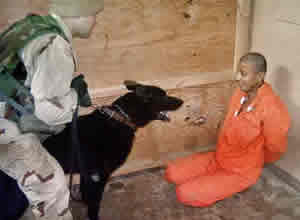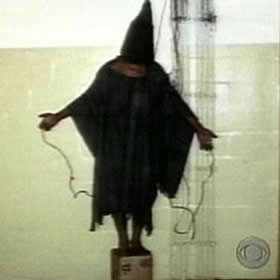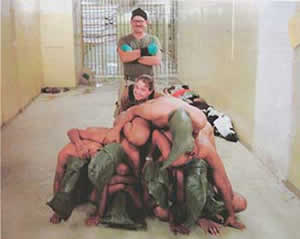
|
American Torture and A Presidential Promise
For Sunday November 23, 2008
Lectionary
Readings (Revised Common Lectionary, Year A)
Ezekiel 34:11–16, 20–24
Psalm 100 or Psalm 95:1–7a
Ephesians 1:15–23
Matthew 25:31–46
 |
At the end of history, says Jesus, God will judge "all the nations" (Matthew 25:31). Divine judgment will be based partly on how nations treat their prisoners (25:36, 39, 43, 44). This makes for uncomfortable reading for Americans who take the truth of the gospels and the treatment of prisoners with equal seriousness.
In November 2001, Americans captured al-Qahtani Mohammed in Afghanistan and sent him to prison at Guantanamo, Cuba. A year later, when it was discovered that he had probably been an additional hijacker for the 9-11 terrorist attacks and a member of al-Qaeda, Qahtani was placed in isolation for 160 days. During that time he was subjected to aggressive interrogation techniques twenty hours a day for fifty-four straight days. His interrogation logs, in fact, were published by Time magazine on March 3, 2006. Qahtani was not charged with any crimes for six years, not until February 11, 2008, and those charges were dropped by the Pentagon on May 12, 2008.
On December 5, 2002, a twenty-two year-old Afghan taxi driver named Diliwar was captured and taken to America's prison at the Bagram Air Force Base. Five days later he was dead. At first the military said that Diliwar had died of "natural causes," but in a later inquiry the coroner testified that his lower body had been "pulpified." On his death certificate issued by the military the box marked "homicide" is checked.
Diliwar, Qahtani, and what the public has seen and heard about America's military prisons at Guantanamo, Bagram, and Abu Ghraib are only the tip of the iceberg. According to Human Rights Watch, "more than 600 U.S. military and civilian personnel [have been] involved in abusing more than 460 detainees." There are at least 83,000 detainees in US custody; 108 of them have died, at least 37 by homicide.
 |
The vast majority of these prisoners were not captured by American forces but turned in by nationals eager for the financial bounty offered by Americans. Diliwar, for example, was detained at a checkpoint by an Afghan warlord who was himself later detained as a suspect in a rocket attack. Only a tiny minority of the prisoners are proven terrorists or valuable intelligence assets. These prisoners cannot now be prosecuted in normal law courts because evidence against them was gathered by torture, they can't very well be released, and so now the US faces the prospect of detaining them indefinitely without charges.
In The Dark Side (2008) by Jane Mayer and Torture Team (2008) by Philippe Sands, the authors reconstruct in meticulous detail how Cheney, Rumsfeld, and their closest aides legalized torture as American public policy. Widespread torture did not "bubble up from the bottom," as the Bush administration claimed, nor was it limited to isolated incidents by "a few bad apples." There were noble administration and military people who demurred and dissented, and genuine heroes in this sordid story like Alberto Mora (General Counsel to the Navy 2001–2006), but virtually all protesters were marginalized. A small "War Council" acted in secrecy to actively exclude all naysayers and by-pass normal protocols of checks and balances — Cheney, Rumsfeld, David Addington, John Yoo, Tim Flanigan, Alberto Gonzales, Doug Feith, Jay Bybee, and Jim Haynes. These powerful ideologues, a weak president, paranoia about further attacks after 9/11, interagency rivalry, and government dysfunction created the "perfect storm."
Torture is immoral in principle (cf. the Universal Declaration of Human Rights). It's also wrong for pragmatic reasons. It produces unreliable results, which proved to be the case with Qahtani; no meaningful intelligence was gathered from him. Torture is a betrayal of American values and longstanding military practice. It puts American soldiers at risk, emboldens our enemies, and undermines America's reputation abroad. Canada, for example, has placed the United States on its list of rogue nations that torture.
 |
Such is the price we've paid for spurning civilization's "last nearly universal moral taboo" (Mayer). Sands and Mayer show that those who were responsible for torture are guilty of war crimes in light of the Geneva Conventions (Article 3) and the 1984 Torture Convention. They won't be prosecuted here in America, of course, but Sands is very serious when he warns these officials that they should be careful about traveling overseas.
President-elect Obama has been outspoken in his opposition to torture, his insistence that America respect constitutional law and international treaties, his support of habeas corpus (which for 700 years has protected the rights of prisoners from unlawful detention and coercive or arbitrary force by the state), and his disagreements with the Military Commissions Act of October 17, 2006 (part of which was struck down by the Supreme Court on June 12, 2008).
On August 1, 2007, Obama made a speech at the Woodrow Wilson International Center in Washington, DC. In that speech he made a promise.
In the dark halls of Abu Ghraib and the detention cells of Guantánamo, we have compromised our most precious values. What could have been a call to a generation has become an excuse for unchecked presidential power. A tragedy that united us was turned into a political wedge issue used to divide us.
When I am President, America will reject torture without exception. America is the country that stood against that kind of behavior, and we will do so again ... As President, I will close Guantánamo, reject the Military Commissions Act, and adhere to the Geneva Conventions. Our Constitution and our Uniform Code of Military Justice provide a framework for dealing with the terrorists ... The separation of powers works. Our Constitution works. We will again set an example to the world that the law is not subject to the whims of stubborn rulers, and that justice is not arbitrary.
I pray that Obama keeps his promise; the soul of our nation is at stake.
For further reflection:
* Watch the film Taxi to the Dark Side, which won an Academy Award as best documentary for portraying detainee abuse and torture at Bagram, Abu Ghraib, and Guantanamo.* Jane Mayer, The Dark Side; The Inside Story of How The War on Terror Turned Into a War on American Ideals (New York: Doubleday, 2008).
* Philippe Sands, Torture Team; Rumsfeld's Memo and the Betrayal of American Values (New York: Palgrave, 2008)
Image credits: (1) Streetcow.com; (2) Sophia's Peace Work; and (3) The Washington Note.





